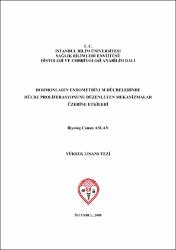Hormonların endometriyum hücrelerinde hücre proliferasyonunu düzenleyen mekanizmalar üzerine etkileri
Künye
Aslan, Canan. (2008). Hormonların Endometriyum Hücrelerinde Hücre Proliferasyonunu Düzenleyen Mekanizmalar Üzerine Etkileri. Yayımlanmamış yüksek lisans tezi. İstanbul : İstanbul Bilim Üniversitesi, Sağlık Bilimleri Enstitüsü.Özet
Endometriyum streoid hormonların kontrolünde, reprodaktif yaşam süresince aylık
siklus dönemlerinde dejenerasyon, proliferasyon ve diferansiyasyona uğrayan bir dokudur.
Endometriyum hücrelerinin uğradığı bu biyolojik değişiklikler başlıca östrojen ve
progesteron steroid hormonları tarafından düzenlenir. Gerçekleşen implantasyonu takiben
ise insan koryonik gonadotropin hormonu (HCG) progesteronun devamlılığını sağlayarak
gebelik sürecinde önemli bir rol üstlenir. Östrojen, endometriyumun epitel ve stromal
hücrelerinin proliferasyonunda önemli rol oynar. Progesteron ise proliferasyonun
inhibisyonu ve desidualizasyon olaylarının düzenlenmesinde görev alır.
Çalışmamızda Ishikawa endometriyum epitel hücrelerinde 17-β-östradiol,
progesteron ve HCG’nin hücre proliferasyonu ve hücre siklusunun düzenlenmesinde rol
oynayan p53 ile p21 proteinlerinin ekspresyon düzeyleri üzerine olan etkileri incelendi.
Prolifere hücre nükleer antijeni (PCNA) nin immünositokimyasal (İSK) boyaması ile hücre
siklusunun G1, S, G2 ve M fazlarında olan hücreler işaretlendi. Ayrıca 5- bromo2’-deoksiüridin
(BrdU) işaretleme yöntemi ile S faz hücre oranları değerlendirildi. 17-β-östradiol
uygulanan grupta PCNA işaretli hücreler ile kontrol grubu arasında bir fark izlenmedi
ancak S faz proliferasyon oranında anlamlı bir artış tespit edildi. Proliferasyon oranında
izlenen artış ile p53 ve p21 protein ekspresyon düzeyleri karşılaştırıldığında bir ilişki
gözlenmedi. Progesteron ve HCG uygulanan hücre gruplarının proliferasyon oranları ve
p53, p21 protein ekspresyon düzeyleri ise kontrol grubuna çok yakın değerlerde tespit
edildi.
Elde edilen bulgular doğrultusunda, 17-β-östradiol, progesteron ve HCG
hormonlarının deneyde uygulanan konsantrasyon ve sürelerde Ishikawa hücrelerinin
proliferasyonunun düzenlenmesinde p53 ve p21 protein ekspresyon düzeylerini
etkilemedikleri sonucuna varılmıştır. The endometriyum is a tissue that can develop degeneration, proliferation and differentiation during monthly cycle periods during the entire duration of reproductive life, under control of steroid hormones. Oestrogen and progesterone steroid hormones primarily regulate the biological changes of endometriyum cells. On the other hand, following the
completion implantation, the human chorionic gonadotropine hormone (HCG) plays an important role in pregnancy by ensuring the continuation of progesterone. Oestrogen plays
a major role in the proliferation of endometriyum epithelium and stromal cells. On the other hand, progesterone regulates the proliferation inhibition and desidualisation
processes.
The study examined the effect of 17-ß-oestradiole, progesterone and HCG on cell proliferation and the effect of cell cycles regulating p53 and p21 protein on expression
levels of Ishikawa endometriyum epithelium cells. Cells in the G1, S, G2 and M phases of cellular cycle were marked with immunohistochemical (ISK) marking of proliferated cell
nuclear antigen (PCNA). S phase cell rates were also assessed using 5- bromo 2-deoxiuridine (BrdU) marking method. No difference was observed between the PCNA marked cells and control group subject to 17-ß-oestradiole however, a significant increase was recorded in the rate of S-phase proliferation. No relation was identified in the comparison of increase in proliferation rate and p53 and p21 protein expression levels. The proliferation rates of cells subject to progesterone and HCG and p53 and p21 protein
expression levels were identified to have very close values to control group. In light of the findings, it has been concluded that the 17-ß-oestradiole, progesterone
and HCG hormones at concentrations and durations of experiment, do not effect the p53 and p21 protein expression levels during the proliferation regulation of Ishikawa cells.


















